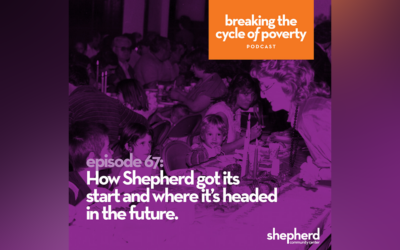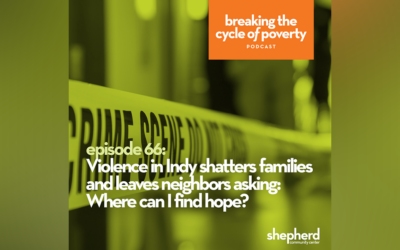In Luke, Jesus is asked, “Who is my neighbor?” He responds by telling the parable of the Good Samaritan, a man who went out of his way to help a stranger in desperate need.
When Shepherd was launched 35 years ago, its mission was to be a good neighbor to people on the near Eastside of Indianapolis. That mission hasn’t changed.
And it’s at the core of what Shepherd Executive Director Jay Height means when he talks about “re-neighboring the ‘hood.”
As part of that effort, the Shepherd team is focused on six areas of ministry, which are highlighted in the following vignettes:
Relationships: Engaging deeper in the neighborhood
Shepherd’s mission is to help neighbors break the cycle of poverty. A big part of completing the mission involves serving as an advocate for neighbors and helping them navigate systems of employment, education, health care, and social services.
Brooke’s story highlights the challenges many neighbors face as well as the support Shepherd offers:
Brooke, a single mother of two children, had a job, but she and her kids were homeless. Her circumstances began to improve after Brooke enrolled her children in Shepherd’s Neighborhood Childcare at Minnie Hartmann.
Brooke was paired with Vera, a mentor with Shepherd’s Paraclete ministry, and the two began to meet weekly to talk about the challenges Brooke faced and to work together on solutions.
At Christmas, Vera took Brooke shopping, with the help of a donor-supplied voucher. Brooke was able to buy gifts for her children and, as an aspiring cake decorator, baking pans for herself.
By the following spring, Brooke and her children had moved into an apartment. And Brooke was hired to work in the childcare center at Minnie Hartmann.
Vera saw hope blossom in Brooke’s life despite the challenges she still faced. Vera asked her: “What does success look like for you today?”
“That’s easy,” Brooke said. “Success is the life I’m living today, and that is a result of Shepherd Community Center.”
Providing high-quality education
Having access to a good education and having the support needed to excel in school are essential factors in breaking the cycle of poverty. Shepherd provides a range of educational options for students and their families:
Shepherd Academy (Grades K-6): Students’ math and reading test scores at the end of the 2021-22 school year showed steady improvement. For third graders, 67% demonstrated at least a year’s worth of academic growth in math on the state exam. And 34% of the students gained more than a year in academic achievement. In reading, 78% achieved a year of academic growth, and 50% of those students exceeded a year.
In the fifth grade, 75% of students passed the ILEARN reading test, with 72% reading at grade level. And 87% of students who had attended Shepherd Academy for three years or more were reading at grade level.
The test results were the best in the academy’s history and can be attributed to the school’s small class sizes, mentoring and tutoring, and care and support for students that extend well beyond the classroom.
After-school care, elementary: The program puts a strong emphasis on helping students complete homework as well as tutoring. One student, Jessa, said her grades had significantly improved because of the homework help and tutoring she received in the program.
Summer program: Diego had struggled greatly in school, but after building relationships with staff, interns, and students at Shepherd’s summer program, he said he wanted training to become an auto mechanic. Although he’s still in high school, Diego was able to enroll in City Life Wheels, a Shepherd partner that teaches young people on the near Eastside the basics of auto mechanics.
Supporting physical and mental health
People living in poverty are often living in isolation and suffering from mental and physical health challenges. Jack’s story shows how Shepherd’s Shalom team helps to meet neighbors’ needs where they live, whether that’s in a house, on the street, or in a car:
Shalom team members Indianapolis police officer Adam Perkins and paramedic Shane Hardwick were told about a man living in an abandoned car in an alley on the near Eastside. When they went to investigate, they found a frightened young man huddled in the back of an SUV.
Hardwick and Perkins recognized the man, Jack, who they previously had taken to a hospital for mental health treatment. To regain Jack’s trust, Hardwick and Perkins told him they would bring him supplies so he wouldn’t have to leave the vehicle.
Then, searching through his records, they found that Jack had not picked up his medications from a pharmacy and had not received mental health treatment. So, they took Jack’s medications to him in the alley.
Jack opened the door to the SUV and engaged in a conversation with the paramedic and police officer. They found out that Jack’s family had been evicted from their home, and although the rest of the family had found suitable places to stay, Jack was left to live in the alley. He had only shorts and a T-shirt to wear and nothing to keep him warm at night while sleeping in the vehicle.
Jack agreed to let Hardwick and Perkins take him to a hospital for treatment. On the way, they stopped to buy him food, and then helped Jack check into the hospital.
Even then, their job was not yet done. Hardwick and Perkins contacted Jack’s family to let them know about his condition and whereabouts. Family members described Jack as “lazy” and that he liked to “act scared.” But they also disclosed that Jack’s brother had been diagnosed with schizophrenia. The family, however, had not sought treatment for Jack.
Hardwick and Perkins helped Jack receive psychiatric treatment at Eskenazi Health and began working to ensure that he would have a support system in place after he left the hospital.
Because of Shepherd’s Shalom team, Jack now has hope for a much healthier, safer, and less frightening future.
Ensuring stable housing
In 2022, Shepherd began offering neighbors small loans to help them pay rent and utilities. The interest-free loans, of $300, can be repaid gradually ($25 a month) or through volunteering at Shepherd.
Through a partnership with the University of Indianapolis, Shepherd has helped families find good-quality rental homes. One of the families had been living in a motel for more than six months.
Working with Habitat for Humanity, Shepherd hosted a first-time home-buyers class. Several families in the class qualified for a home through Habitat for Humanity. Shepherd staff is working with other families to help them reach the financial level of being able to qualify to become homeowners.
Feeding the hungry
Helping neighbors have enough nutritious food to feed their families and themselves is about more than simply handing out food. It’s also about building relationships so that neighbors eventually have the capacity to help themselves. A volunteer named Joseph shows why such relationships are so important:
Joseph is a volunteer driver who delivers food once a month to neighbors who either cannot get out of the house or lack transportation. Joseph recently delivered food to Holly, who was suffering emotionally after the deaths of four family members in an accident.
Joseph listened as Holly talked about the emotional pain she was experiencing because of her family’s tragedy. Joseph prayed with and encouraged Holly and told her about the counseling services that Shepherd offers.
“It is amazing how food can just be the open door to getting to know someone and love them as Christ calls us to love,” Joseph said. “Food opens the door to the hope Shepherd offers to our neighbors; a hope so few know is available for them.”
Employment: Helping neighbors find sustainable jobs
A family-sustaining job is the best way to break the cycle of poverty for current generations and beyond. Shepherd helps neighbors to find a job, get a better job, and then prepare for and enter a career.
Celeste is one of Shepherd’s neighbors who’s on the path to securing a sustainable job:
Shepherd helped Celeste, who is a single mother, to enroll in a nurses training program, where she earned a certified nurse aide certificate and then started clinical training. After Celeste has completed clinicals and starts a job, Shepherd staff will help her create a budget based on her new income and assist her in staying on track to meet academic and career goals.
Two words come up repeatedly as Shepherd staff and volunteers provide assistance in a variety of ways: Neighbors and hope.
Like the Good Samaritan, the Shepherd team strives to offer hope amid hardships. Health care, housing, food, education, and jobs are vital, of course. Even more essential is knowing that a community of neighbors loves you in the good times and bad.




